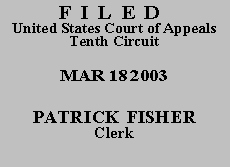

| UNITED STATES OF AMERICA,
Plaintiff - Appellee, v. TERRY WAYNE GLENN, Defendant - Appellant. |
and 96-CR-151-H) |
Section 2255 allows one year from the date a judgment of conviction becomes final in which a defendant can file a motion to vacate, set aside, or correct a sentence. 28 U.S.C. § 2255(1). Defendant's judgment of conviction became final on April 5, 1999; he did not file his § 2255 motion until September 14, 2000. But he argues that the limitations period should be equitably tolled because his attorney failed to notify him of this court's decision on direct appeal, and he did not receive a copy of that decision until sometime in July of 2000. The district court declined to apply equitable tolling and dismissed the § 2255 motion for lack of jurisdiction because it was not timely filed.
We review de novo the district court's dismissal of defendant's motion as untimely. Woodward v. Williams, 263 F.3d 1135, 1141 (10th Cir. 2001), cert. denied, 535 U.S. 973 (2002). And we review the district court's refusal to apply equitable tolling to excuse the untimely filing for an abuse of discretion. Id. at 1142. Equitable tolling "is only available when an inmate diligently pursues his claims and demonstrates that the failure to timely file was caused by extraordinary circumstances beyond his control." Marsh v. Soares, 223 F.3d 1217, 1220 (10th Cir. 2000).
In considering the issue of equitable tolling, the district court assumed the truth of defendant's assertion that his attorney did not inform him of this court's decision until July 2000. On September 11, 1999, however, defendant received a letter from a paralegal firm informing him that his appeal had been decided.(2) Defendant did not attempt to contact his attorney to inquire about his appeal after receiving the paralegal firm's letter. In fact, he did nothing for another nine months. In early June 2000, defendant contacted the Federal Public Defender's office to inquire about the status of his appeal and was advised to contact his court-appointed attorney directly. Finally, on June 15, 2000, defendant wrote to his attorney, explaining that he had received a letter from a paralegal group referring to the dismissal of his appeal and requesting copies of his file so that he could prepare a post-conviction motion. The attorney promptly responded, and by July 3, 2000, defendant possessed all materials available for the preparation of his § 2255 motion.
Based on these facts, the district court concluded that defendant was not reasonably diligent in pursuing his claims and, as a result, was not entitled to the benefit of equitable tolling. We agree. The district court did not abuse its discretion in declining to apply the doctrine of equitable tolling to save defendant's untimely motion. We AFFIRM the district court's judgment. We grant the Motion for Leave to Proceed on Appeal Without Prepayment of Costs or Fees.
Entered for the Court
Circuit Judge
*. This order and judgment is not binding precedent, except under the doctrines of law of the case, res judicata, and collateral estoppel. The court generally disfavors the citation of orders and judgments; nevertheless, an order and judgment may be cited under the terms and conditions of 10th Cir. R. 36.3.
1. After examining the briefs and appellate record, this panel has determined unanimously that oral argument would not materially assist the determination of this appeal. See Fed. R. App. P. 34(a)(2); 10th Cir. R. 34.1(G). The case is therefore ordered submitted without oral argument.
2. The letter stated that the paralegal firm had come across the decision in defendant's direct appeal, and it offered the firm's services to attempt to gain a reduction in defendant's sentence.